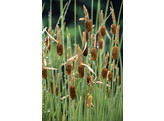Scientific name: Typha minima
Dutch name: Dwerglisdodde
French name: Massette
English name: Dwarf reed mace
Plant height: 40 / 60 cm
Ideal depth: 0 / -40 cm
Flowering months: IX-XI
Colour of the flowers: not applicable
Suggested plant zone: zone 2/3
Desciption of suggested plant zone: Riparian plant and marsh plant

Plants' info NL: Dit is de kleinst blijvende soort lisdodde die bestaat. Het fijne, grasachtige, lijnvormige, opgaande blad (1-3 mm breed) is blauwgroen. De bloeiwijzen aan de toppen van de bloeistengels bestaan uit dikke, bijna ronde, bruine, vrouwelijke bloemproppen (2-5 cm hoog) met de gele manlijke er als een ‘staartje’ boven. Bij alle lisdodden worden de bloemen door de wind bestoven. Deze soort komt voor in het hele gematigde klimaatgebied van Europa tot ver in Azië. Vooral deze soort heeft veel zon nodig (schaduw wordt slecht verdragen) en groeit in voedzame grond in ondiep water in de vijverrand en het moeras (ook in mini-vijvers). Dwerglisdodden woekeren niet of nauwelijks. Goed winterhard.
Plants' info EN: This is the smallest species of Bulrush in existance. The fine, grassy, linear, upright growing leaves (width 1-3 mm) are bluish-green. The inflorescenses on top of the flower-stems are composed of thick, almost ball-shaped, brown, female, dumpy flowers (2-5 cm tall) with the yellow male ones like a ‘tail’ on top. With all bulrushes the flowers are pollinated via wind. This species is endemic in all of the moderate clime-zones in Europe to far into Asia. Especially this species needs a lot of sun (shadow is less tolerated). It grows well in fertile soil in shallow water in pond-edges and marshes (in mini-ponds too). Dwarf Bulrushes are hardly or non-invasive. Good winter-hardy.
Dutch name: Dwerglisdodde
French name: Massette
English name: Dwarf reed mace
Plant height: 40 / 60 cm
Ideal depth: 0 / -40 cm
Flowering months: IX-XI
Colour of the flowers: not applicable
Suggested plant zone: zone 2/3
Desciption of suggested plant zone: Riparian plant and marsh plant

Plants' info NL: Dit is de kleinst blijvende soort lisdodde die bestaat. Het fijne, grasachtige, lijnvormige, opgaande blad (1-3 mm breed) is blauwgroen. De bloeiwijzen aan de toppen van de bloeistengels bestaan uit dikke, bijna ronde, bruine, vrouwelijke bloemproppen (2-5 cm hoog) met de gele manlijke er als een ‘staartje’ boven. Bij alle lisdodden worden de bloemen door de wind bestoven. Deze soort komt voor in het hele gematigde klimaatgebied van Europa tot ver in Azië. Vooral deze soort heeft veel zon nodig (schaduw wordt slecht verdragen) en groeit in voedzame grond in ondiep water in de vijverrand en het moeras (ook in mini-vijvers). Dwerglisdodden woekeren niet of nauwelijks. Goed winterhard.
Plants' info EN: This is the smallest species of Bulrush in existance. The fine, grassy, linear, upright growing leaves (width 1-3 mm) are bluish-green. The inflorescenses on top of the flower-stems are composed of thick, almost ball-shaped, brown, female, dumpy flowers (2-5 cm tall) with the yellow male ones like a ‘tail’ on top. With all bulrushes the flowers are pollinated via wind. This species is endemic in all of the moderate clime-zones in Europe to far into Asia. Especially this species needs a lot of sun (shadow is less tolerated). It grows well in fertile soil in shallow water in pond-edges and marshes (in mini-ponds too). Dwarf Bulrushes are hardly or non-invasive. Good winter-hardy.
Properties
- 2VSP5978
- 8713469106153
- 6


_1.png)